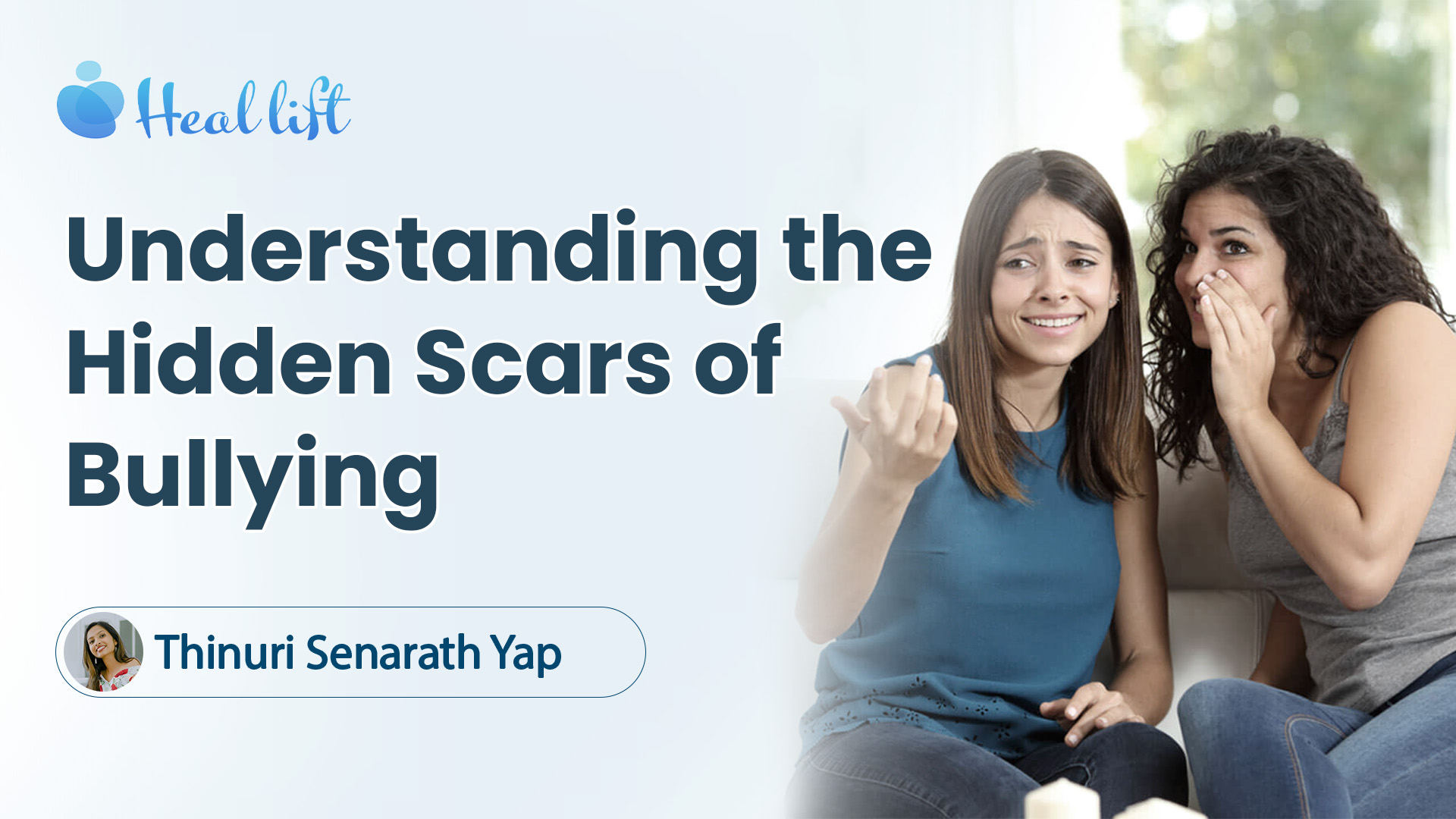Anuja Wickramasingha - 17 Jan 2024
From Failure to Triumph : Life's Resilience with the movie "12th Fail"
Have you ever considered how it feels to lose after putting in so much effort? Until you've experienced it, you may not understand.

Heal Lift

Bullying leaves marks far beyond visible bruises, creating invisible scars that linger and affect well-being, self-esteem, and trust in others. In Sri Lanka, nearly 47% of children report experiencing bullying in or around school at least once a month. Globally, studies have shown that victims of bullying are at a higher risk of mental health struggles, and Sri Lanka's children are no exception.
Bullying isn't limited to the schoolyard, it shows up in workplaces, homes, and increasingly, online. Each setting brings unique forms of bullying, but the emotional toll is similar across contexts.
School Bullying: Where It Often Begins
Schools are the most common settings associated with bullying, and it can manifest in many forms - physical, verbal, and psychological. In Sri Lanka, 30% of students report being regularly mocked or made fun of, and 13% say they feel threatened by their classmates. These experiences can create a culture of fear and insecurity, impacting students' mental health and academic performance.
How We Can Step Up in Schools
- Create Awareness Programs: Schools can implement anti-bullying awareness sessions where students learn to recognize and report bullying behavior.
- Encourage Peer Support: Schools can establish peer mentoring programs where older students help younger ones feel safe, particularly in vulnerable situations like breaks or transitions between classes.
- Train Teachers: Equipping teachers with skills to spot and address bullying in its early stages is crucial. Training should include strategies for intervening sensitively and supporting both victims and perpetrators with empathy and counseling.
Cyberbullying: The Silent Threat
Cyberbullying is a newer form of bullying, but it's on the rise globally. With increased internet access in Sri Lanka, particularly during the pandemic, online harassment has surged. The Sri Lanka Computer Emergency Response Team (SLCERT) reported that 15,000 online abuse cases were recorded in 2021 alone, with about 8,000 related to cyberbullying. Cyberbullying can range from sending hurtful messages to spreading rumors and doctored images on social media. The unique aspect of cyberbullying is its persistence - it follows victims into their personal spaces, affecting them even in what should be their safe zones.
How We Can Step Up Against Cyberbullying
- Promote Digital Literacy: Schools and communities can teach responsible internet use and digital etiquette from an early age to help students navigate online interactions safely.
- Encourage Reporting: Children and parents should know how to report cyberbullying incidents on platforms like Facebook or Instagram. Additionally, they can report to SLCERT or school authorities.
- Parental Supervision: While respecting privacy, parents can take an active role in monitoring younger children's online activities to recognize any early signs of cyberbullying.
Workplace Bullying: A Silent Epidemic Among Adults
Bullying doesn't stop when we leave school; it often reappears in workplaces. Workplace bullying can be subtle, making it harder to address. Common forms include spreading rumors, withholding important information, excessive criticism, and social exclusion. This behavior can create a toxic work environment, leading to high turnover, stress, and even physical health problems.
In Sri Lanka, where a strong sense of hierarchy exists in many workplaces, younger employees may feel particularly vulnerable to bullying from superiors. They may hesitate to report mistreatment due to fear of retaliation or job loss.
How We Can Step Up in the Workplace
- Establish Clear Policies: Companies should have strict anti-bullying policies that include definitions of unacceptable behavior and procedures for reporting incidents confidentially.
- Promote an Inclusive Culture: Fostering a work culture where employees feel respected and valued helps prevent bullying behaviors.
- Provide Support Systems: Access to mental health resources, such as counseling and Employee Assistance Programs (EAPs), can support those affected by workplace bullying.
Family Bullying: When Home Isn't Safe
Families are supposed to be places of love and safety, but bullying can sometimes come from those closest to us. Family bullying can include verbal abuse, constant criticism, manipulation, and even physical aggression. In Sri Lanka, societal norms sometimes downplay these behaviors, especially when they come from elder family members. However, family bullying can have long-lasting effects on mental health, affecting children's development and self-esteem well into adulthood.
How We Can Step Up at Home
- Encourage Open Communication: Families can create safe spaces where everyone feels heard. Encouraging children to express their feelings without fear helps reduce power imbalances.
- Teach Conflict Resolution: Parents can model and teach positive ways to manage disagreements that don't involve criticism or aggression.
- Seek External Help if Needed: If family dynamics become too challenging, seeking family counseling or mental health support can provide neutral guidance to rebuild a safe environment at home.
Moving Forward: The Role of Empathy and Support
The scars of bullying, whether from school, work, family, or online, are hard to heal alone. Research shows that individuals who have support - friends, family, counselors, or mentors, are more resilient in the face of bullying. A study by UNICEF found that victims who confided in someone experienced significantly less emotional distress. Simply being able to share their story can be a first step toward healing.
Whether it's offering a listening ear, reporting abusive behavior, or creating safe spaces, we all have a role to play in ending the cycle of bullying across all spheres of life. Healing is possible, and every supportive action brings those impacted one step closer to recovery.
Creating a Culture of Kindness
Bullying is more than just words or actions; it's a trauma that requires time, empathy, and community support to heal. As a society, we can work toward fostering environments - both online and offline, that are kinder and safer for everyone. Whether it's through listening, offering a helping hand, or standing up against bullying, we can help those impacted by bullying move beyond the bruises and reclaim their lives.
Lastly, if you are a victim, here's your call to reach out for help; you're not alone!
